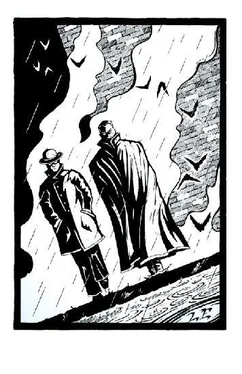And then a thought unbidden: would Holmes not also be saved thus?
Watson clenched his teeth so hard, he heard them squeak in his head.
At the gaping maw of the hull breach, Holmes stopped, resting a foot against the lowered shards of shattered planks like so many broken teeth. Watson crept close, peering in around Holmes’ shoulder, sensing large crates just out of sight in the gloom, and smelling a peculiar, vaguely familiar reek. Shouldering the Enfield, Watson prepared his service revolver, and whispered: “Ready.”
Holmes eased himself into the ship with a lithe, silent cat’s step, and Watson followed with the scrabbling grace of a bulldog charging a hedge.
The ship creaked and groaned under its own shifting weight, making Watson flinch at the erratic noises. Dim arctic light spilled in between gaps in the ancient planks, or through the massive puncture, turning absolute darkness into a frigid murk. Snow ground beneath their boots for a ways, then wood alone sounded out. Wooden crates lay in haphazard piles, worrying Watson with their proximity. Anything could be lying in the shadows, hidden from sight — just waiting for them to pass.
Inching forward, Holmes made the bulkhead door, sheathing the knife to work the portal with his gloved hands. “Heat,” he murmured, glancing back at Watson, and gesturing at the sliding bolt that held the door fast. Slipping the latch back, Holmes shouldered the door open, and both men were instantly met by a fetid, sweltering breeze drenched with the odor of rotted vegetation, dank soil, and endless rain. It was downright tropical, that wind. Watson placed the smells, the temperature, and the humidity as something more Caribbean than Arctic in derivation.
A small access corridor cut longitudinally across the length of the ship, leading to darkened stairwells at both ends. Before the intruders, and slightly to the right, another bulkhead door led into what Watson supposed would be the cargo-hold proper. He grunted, and lifted the pistol off his hip, edging in front of Holmes to take the lead. With the clear view, he could see a pale, feeble light shining around the edges of the door. “Shoot to kill,” Holmes whispered from very close behind. “This will be hot work at close quarters.”
Watson heard the oily rasp of the knife being drawn from its sheath, and the sound made him think of Indian cobras.
Watson approached the portal, braced his legs wide as if in a scrum. He tried the knob and found it sticky, but unlocked. Turning it, he shouldered the door in and crouched down, blinking as a gust of air hit him in the face as though he’d just opened a baking oven.
Hanging seal-oil lamps cast even, gentle light around a large room, and Watson’s mind reeled at the sight. Chests of doubloons and small ingots of gold lay open, or in smashed piles of wood and metal. Light caromed off emeralds and rubies set in rings and bracelets; turquoise and silver belts and bangles lay in casual heaps. It was all the wealth Watson could have imagined in three lifetimes of adventure, but he barely registered the opulence, so thunderstruck was he by the room’s other contents.
The floor was overgrown with moss and a thick, spongy loam. A great tree trunk pushed up out of the floor and thrust up through the roof, presumably spreading out amongst the upper decks. And at the base of the tree lay an altar of human skulls, bracketed and reinforced with golden framing. A large gong stood off to one side, its face engraved in the style of the Aztecs to reveal a circular procession of creatures real and imagined. As Watson’s eyes scanned the room, Aztec fixtures and carvings, furniture and treasure littered the scene: looted, and herein preserved before they could have been melted down and recast in Spanish forms.
A Nunamiut girl lay upon the altar, her arms and legs outstretched and quivering as though restrained by some unseen force. Her eyes stared and rolled in their sockets, reminding Watson of the horses at Maiwand as they bolted in panic. She was dressed head to toe in ornate woven feathers and reeds: a great head-dress; a sort of corset; a skirt and loincloth. Her pale limbs trembled, her northern pallor utterly alien to the clothing and the scene around her. Upon her breast, a cruel silver dagger lay flat, its edge curved like the undulating path of a winding serpent.
Watson moved into the room, throwing back his hood against the heat. Sweat poured from his brow, and he wiped his face with the sleeve of his left arm to clear his vision. Stepping towards the girl, he felt a thrill of shock shoot through him, like a tremendous charge of static electricity, and all at once he found himself transported…
From a great height, as though he were a gull on the wing, he looked down and watched as members of the Netsilik tribe abandoned one of their elderly to die alone on pack ice. In his fear and isolation, the man called out, and many leagues to the west, the altar answered. “I am Tezcatlipoca,” a voice crooned in the tribesman’s head. “Come to me and live.”
The man came. On foot and alone, he should have perished, but he came. He and other outcasts, over the span of centuries crossed the ice at the altar’s will, and were preserved by it in perpetuity. Hunting settlements with shamans and spells of protection could not hear the voice, would not heed it: when such settlements came close enough to the wrecked ship, they died. Watson saw it happen, heard it explained in a language not of words, knew it to be true even as all sense of distance and time drifted away from him.
A jungle rose up before John Watson, and great flat-topped pyramids of stone appeared. An endless parade of human sacrifices came and went, screaming and wriggling in unheeded agony. The sun blazed hot in a cloudless sky, its trajectory assured by the constant killing, and in the minds of the priests a voice was heard: “I am Tezcatlipoca. Kill for me and live!”
Arctic winds blew as huddled proto-Siberians crossed into North America for the first time, bringing with them the voice; naming it; speaking it. They spread down through the continent over the course of millennia, eventually becoming the Inca, the Maya and the Aztec, but they never forgot the ice deep and submerged in their hearts. “I am Tezcatlipoca, who was Tezkul-oc,” the voice said, and the hot, moist, Aztec voice was tinged with ancient frost.
A storm raged at sea; a Spanish captain, eyes wild with hysteria, fought the elements as he lashed himself to his wheel. “I am Tezcatlipoca,” the voice boomed in his head. “I will go home.” That which had been plundered now took command; the altar with a hellish will of its own sped the ship ever northward to its icy doom.
“I am Tezcatlipoca,” the voice now thrummed in Watson’s head, roaring the way a pounding sea crashes against the surf. “Kill for me and live!”
Somehow, Watson had traversed the room, was standing next to the altar. He couldn’t remember dropping his gun, but there it was at the roots of the tree behind him. In his hand, he held the serpentine dagger and had hoisted it high above his head. The girl on the altar squirmed in terror, her neck straining to release a scream that would not come. Watson gasped at the effort of resistance it took to stay his hand — the dagger poised to plunge down and into the chest plate of the trembling sacrifice.
And then: Sherlock Holmes.
The Zulu knife met the serpentine with a ringing clang, and lightning-blue light blasted forth from the contact. The girl unleashed her scream at last, a distant echo to the screams of long lost sisters who had died generations ago and continents away. The girl screamed, and Watson screamed with her as dark magicks surged through his body like a completed circuit. Arcane war was fought out in his cells; his limbic system became a bubbling battleground. And all around, the room was drenched in the sudden white hot light of African and Mexican suns in collision.
Читать дальше












